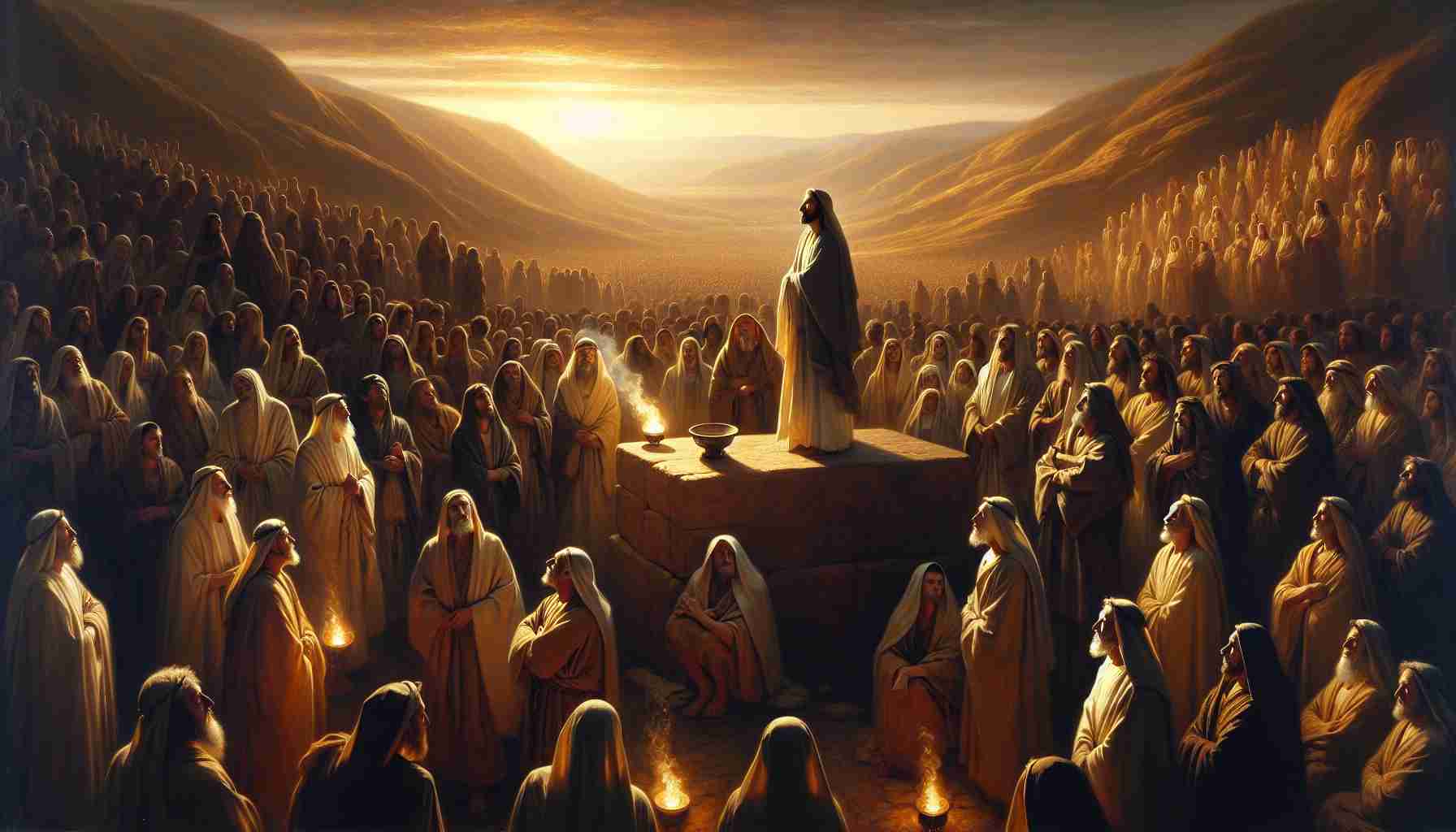

I was a scribe’s apprentice when the prophet Shmuel—you may know him as Samuel—anointed Israel’s first king. I wasn’t important, just a boy who carried scrolls and ground ink. But I was there the day Shaul—Saul, son of Kish—was chosen, and I remember how strange it felt to watch the future tremble into view.
It happened near Mitzpah. The elders had begged Shmuel to give us a king, like the other nations. He warned us what kings would demand—our sons, our harvests, our silver—but the people didn’t care. They wanted someone to lead them into battle. Someone strong. Someone they could see.
Shmuel prayed long and quietly, then cast lots before the people. First one tribe, then one family, until finally, he spoke the name: “Shaul ben Kish, from the tribe of Binyamin.”
The crowd hushed. Heads turned. But no one stepped forward.
Whispers passed through the assembly. “Is he afraid?” someone asked. “Was this a mistake?”
Shmuel closed his eyes again and asked Hashem—the name we use for God—for direction. Then he turned and pointed toward the outer camp.
“He is hiding among the baggage.”
The people gasped. Runners dashed through the tents, and soon they returned, dragging out a man so tall he seemed to block the sun. His face was flushed. His hands, uncertain.
That was Shaul.
He looked nothing like the rulers I’d imagined—no armor, no roar of victory. Just a quiet giant who had tried to run.
Still, when Shmuel lifted his voice and cried, “Here is the one Hashem has chosen!” many shouted with joy. But not all.
Near me, a group of men muttered, “This man? He can’t save us.” They refused to honor him, refused to even bring him gifts.
I watched Shaul closely. He heard them. I saw it in his eyes. But he said nothing. No argument. No anger. Just silence.
Later that evening, I asked Shmuel why Shaul didn’t defend himself.
Shmuel said, “A man who needs to prove his calling to doubters isn’t ready to lead. A man who knows Hashem has chosen him doesn’t need to speak.”
That stayed with me.
Over time, Shaul would fight battles and carry the weight of the crown—sometimes well, sometimes not. But I never forgot the moment he stepped out from the baggage. Not with pride. Not with fire. But with quiet obedience.
And that, I think, is where true leadership begins—not with power, but with surrender to the One who calls.
I was a scribe’s apprentice when the prophet Shmuel—you may know him as Samuel—anointed Israel’s first king. I wasn’t important, just a boy who carried scrolls and ground ink. But I was there the day Shaul—Saul, son of Kish—was chosen, and I remember how strange it felt to watch the future tremble into view.
It happened near Mitzpah. The elders had begged Shmuel to give us a king, like the other nations. He warned us what kings would demand—our sons, our harvests, our silver—but the people didn’t care. They wanted someone to lead them into battle. Someone strong. Someone they could see.
Shmuel prayed long and quietly, then cast lots before the people. First one tribe, then one family, until finally, he spoke the name: “Shaul ben Kish, from the tribe of Binyamin.”
The crowd hushed. Heads turned. But no one stepped forward.
Whispers passed through the assembly. “Is he afraid?” someone asked. “Was this a mistake?”
Shmuel closed his eyes again and asked Hashem—the name we use for God—for direction. Then he turned and pointed toward the outer camp.
“He is hiding among the baggage.”
The people gasped. Runners dashed through the tents, and soon they returned, dragging out a man so tall he seemed to block the sun. His face was flushed. His hands, uncertain.
That was Shaul.
He looked nothing like the rulers I’d imagined—no armor, no roar of victory. Just a quiet giant who had tried to run.
Still, when Shmuel lifted his voice and cried, “Here is the one Hashem has chosen!” many shouted with joy. But not all.
Near me, a group of men muttered, “This man? He can’t save us.” They refused to honor him, refused to even bring him gifts.
I watched Shaul closely. He heard them. I saw it in his eyes. But he said nothing. No argument. No anger. Just silence.
Later that evening, I asked Shmuel why Shaul didn’t defend himself.
Shmuel said, “A man who needs to prove his calling to doubters isn’t ready to lead. A man who knows Hashem has chosen him doesn’t need to speak.”
That stayed with me.
Over time, Shaul would fight battles and carry the weight of the crown—sometimes well, sometimes not. But I never forgot the moment he stepped out from the baggage. Not with pride. Not with fire. But with quiet obedience.
And that, I think, is where true leadership begins—not with power, but with surrender to the One who calls.